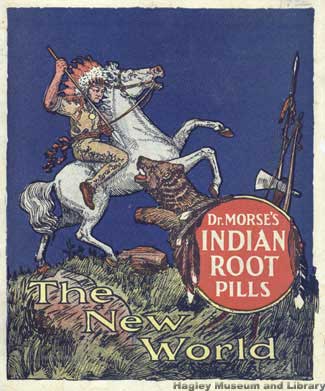
Dr. Morse's Indian Root Pills, circa 1926
One of the most popular patent medicines, Dr. Morse’s Indian Root Pills was almost identical to the hundreds of other cure-alls, or at least claimed to cure the most common ailments of the day. It was advertised as a specific cure for most blood, stomach and liver diseases. The manufacturers claimed that the pills would "absolutely remove all dyspepsia, giddiness, headache, and are most useful in female disorders."
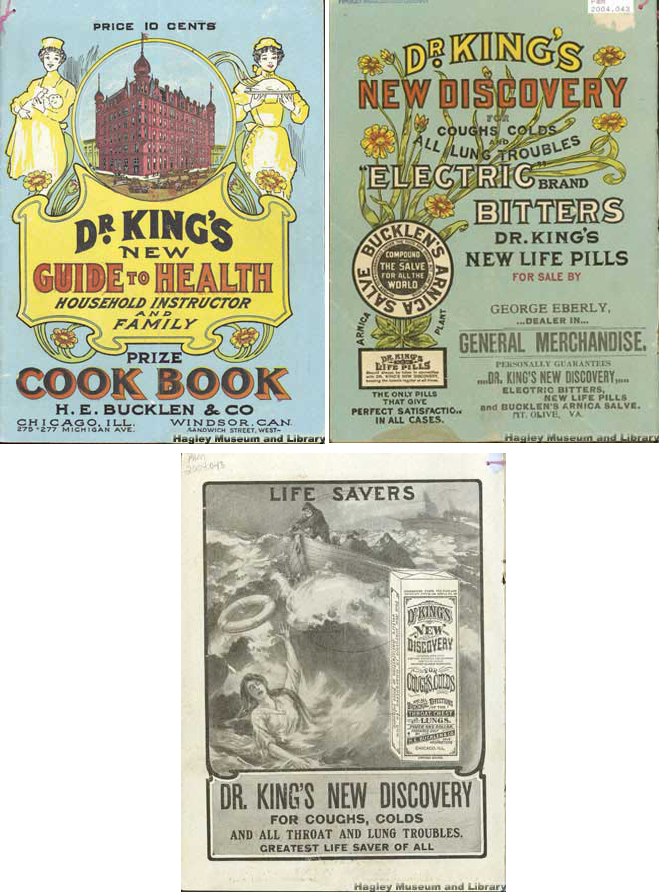
Dr. King's New Guide to Household Health, circa 1907
Promotional literature for H.E. Bucklen & Co., manufacturers of Dr. King's New Discovery for Consumption, Cough & Colds, Dr. Kings's New Life Pills, and Electric Bitters, included testimonials for these products along with general health and household advice. In addition to suggested remedies and treatments for these maladies, this guide to health touts Bucklen's miraculous drugs, along with Bucklen's Arnica salve. The manufacturer claimed this salve could cure "boils, bruises, inflammation, and sores that seemed incurable."
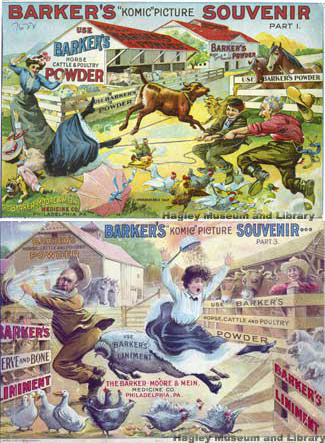
Company, Philadelphia, Pennsylvania
Barker's Komic Picture Souvenir, circa 1895
The Barker, Moore & Mein Medicine Company published a four-part comic book advertising their remedies, which were intended for both man and beast. The "Barker’s Komic Picture souvenir" contained silly, almost nonsensical cartoons of animals and humans in various accidents and mishaps. It was marketed primarily to farmers and cattlemen, but also targeted human beings who might have ailments similar to a horse or chicken. Barker, Moore & Mein claimed that Horse, Cattle and Poultry Powder would heal "chicken cholera, sore throat and other poultry complaints.&
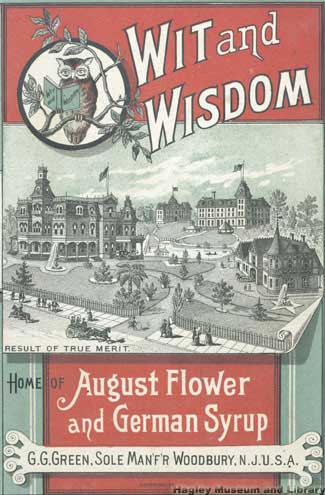
Wit and Wisdom: Home of the August Flower and German Syrup, 1888
Boschee’s German Syrup was a common remedy for coughs, colds and consumption. It was most popular for its claim to "cure" consumption and any disease of the throat and lungs. Green's August Flower was prescribed for dyspepsia, indigestion and liver complaint. German Syrups were given to people for many ailments, but it was most popular for its "curing" of consumption and any disease of the throat and lungs.
G. G. Green's August Flower was also marketed to help digestion to enable thin, sickly people to gain weight. This pamphlet is full of testimonials of people who tried either remedy and praised the miraculous results. The advertisement did not mention the fact that Boschee's German syrup and Green's August Flower both contained morphine.
G.G. Green Firm, Woodbury, New Jersey
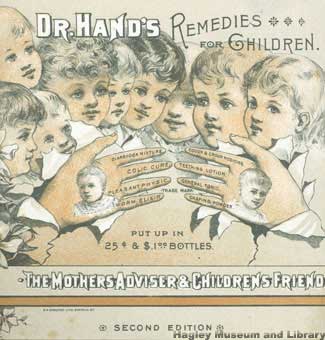
Dr. Hand's Remedies for Children, circa 1885
Dr. Hand manufactured a complete line of children's and infants' remedies: Children's Teething Lotion, Colic Cure and Soothing Mixture, Chafing Powder, Pleasant Physic (for constipation), Children's Diarrhea Mixture, Cough and Croup Medicine, Children's Worm Elixir, and Children's General Tonic.
Dr. D.B. Hand, Scranton, Pennsylvania
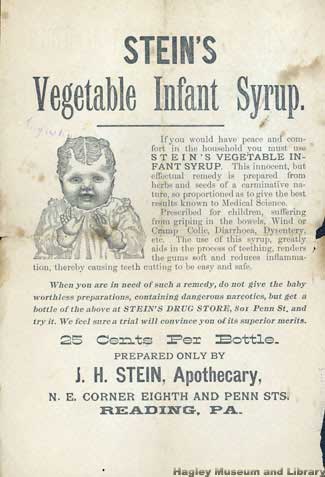
Stein's Vegetable Infant Syrup, circa 1880
This syrup was advertised as a must-have for all mothers who desired "peace and comfort in the household." It was prescribed for children suffering from "griping in the bowels, wind or cramp colic, diarrhoea, dysentery, etc." It also was supposed to soothe the pain of teething by making the gums softer and reducing inflammation. The advertisement claimed that there were no narcotics in the medicine.
J.H. Stein, Apothecary, Reading, Pennsylvania

Schenck's Pulmonic Syrup, circa 1865
Joseph H. Schenck's medicines were advertised as cures for consumption. Schenck's Seaweed Tonic and Mandrake Pills were also promoted as remedies for dyspepsia and liver complaints. This trade catalog illustrated parts of the human lungs and bronchial tubes affected by different types of consumption. At the end were testimonials from people cured from near-death illnesses.
Joseph H. Schenck & Son, Philadelphia, Pennsylvania
Pamphlets Collection and Trade Catalog Collection, Imprints Department. For permission to reproduce or publish images, please contact research@hagley.org.

